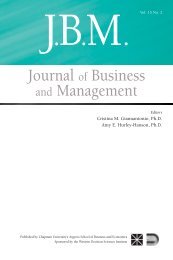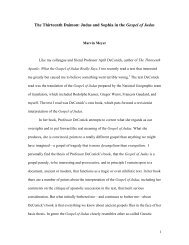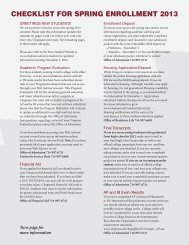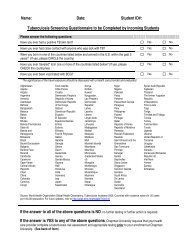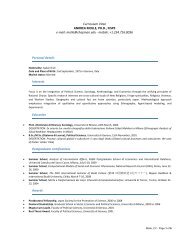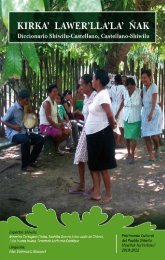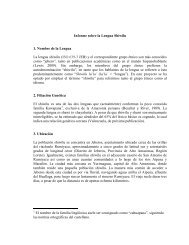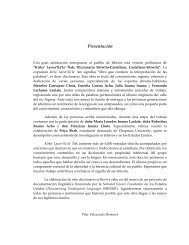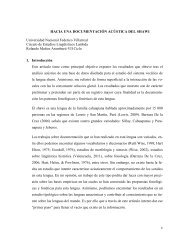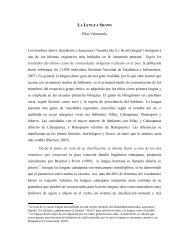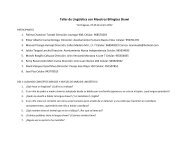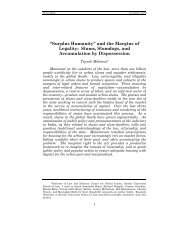- Page 3 and 4:
Shiwilu Dictionary i
- Page 5 and 6:
a- v. > v. instrumental prefix, per
- Page 7 and 8:
5 a'da'wilek'apalli *a'dantapalli (
- Page 9 and 10:
7 *a'iketchek'apalli a'kankanter' a
- Page 11 and 12:
9 a'lachikta'asu' -a'kudeksu' -a'ka
- Page 13 and 14:
11 a'lekker' a'lerpi *lek'apalli. (
- Page 15 and 16:
13 *a'nakupalli -a'masu' inwinsekku
- Page 17 and 18:
15 *a'padiperapalli a'pasudunker' a
- Page 19 and 20:
17 *a'sakek'apalli *a'pidatapalli a
- Page 21 and 22:
19 -a'su' -a'sin -a'sikwa' v. > nom
- Page 23 and 24:
21 a'ukuntuna, a'ukuntunan *a'ukapa
- Page 25 and 26:
23 Abril-duker a'wapu'r a'wapu'pall
- Page 27 and 28:
25 *adawa'kanpalli adanpilannunta'l
- Page 29 and 30:
27 adinuter' Adudek kumaripen Lorgi
- Page 31 and 32:
29 *aki'tapalli aku'ker' *aki'-aki'
- Page 33 and 34:
31 *akusupalli ala'-pasak akusudank
- Page 35 and 36:
33 alei'teklun ala'sa' mama'! Give
- Page 37 and 38:
35 Ama'winadek, Ama'winandek alli's
- Page 39 and 40:
37 amiku'-tanku amu'dek kunparinenn
- Page 41 and 42:
39 *ananpalli anadek -an (-en) v. >
- Page 43 and 44:
41 añimercha ankunlan asu' dudinpu
- Page 45 and 46:
43 *apektapalli anpulu' monkey's ha
- Page 47 and 48:
45 *aperku'tapalli aperapilalli ape
- Page 49 and 50:
47 apisadatutek apu'ker' enpu'nipa'
- Page 51 and 52:
49 ashu'llinku arús Arkichu nprop.
- Page 53 and 54:
51 *auklu'palli atamutu' domains: 5
- Page 55 and 56:
53 awinencher' awerama llinllinen W
- Page 57 and 58:
55 chi'lek-kanka *chek'apalli a'ta'
- Page 59 and 60:
57 chichilu' Chilli chichir'! Poop
- Page 61 and 62:
59 *chimentapalli chimipi crawl on
- Page 63 and 64:
61 chinku'tek chinchen dekkana. Pet
- Page 65 and 66:
63 chiper, chintenlu' chiper' chint
- Page 67 and 68:
65 chiter'lla chuchu chiter', chite
- Page 69 and 70:
67 *da'dektapalli da'apanunta'lli L
- Page 71 and 72:
69 da'mekter' da'ker' da'kanchinekk
- Page 73 and 74:
71 *da'siwa'palli *da'tu'palli ima
- Page 75 and 76:
73 dadapudeklu' *dada-tapalli *da'w
- Page 77 and 78:
75 damellada dakuta'tek became emba
- Page 79 and 80:
77 *damerapilalli Dañir We talked
- Page 81 and 82:
79 *dansu'palli dankur' *dankupalli
- Page 83 and 84:
81 dasu'lasha dawík sawellinenlusa
- Page 85 and 86:
83 *dekchinkatapalli dek- Ama'winan
- Page 87 and 88:
85 *dekkuntapalli *deklutapalli hav
- Page 89 and 90:
87 dekpandanektapalli *deksamerapal
- Page 91 and 92:
89 dektuna, *dekwa'palli dektunan d
- Page 93 and 94:
91 den'apili'ñi denshipa' Yalli'wa
- Page 95 and 96:
93 *dinker'apalli *di'tapalli di'se
- Page 97 and 98:
95 *dinsuwilapalli *dinpek'apalli *
- Page 99 and 100:
97 *du'apalli dudinpu' du'-sipa (si
- Page 101 and 102:
99 *dulerpitapalli dun *duletchulli
- Page 103 and 104:
101 dunsankek dunkerker' ima, kana
- Page 105 and 106:
103 *ekchiterapalli ek- e'chek etch
- Page 107 and 108:
105 ekkilalalusek ekka'lupi Magdale
- Page 109 and 110:
107 *ekkuipalli ekmupalli ka'lli. N
- Page 111 and 112:
109 *ekpanpalli Eksadek your cerami
- Page 113 and 114:
111 *ektu'pincha'lli elli'ta'masu'
- Page 115 and 116:
113 enka'ler' enchu waser. (sem. do
- Page 117 and 118:
115 enmu'dek enmunker' kaluwi' Asu'
- Page 119 and 120:
117 enpu'ninchi enpi'sha enpi'pu' p
- Page 121 and 122:
119 -er'ken er'wi pilu'erkek. The c
- Page 123 and 124:
121 -etchenma' Erpina' names "mañi
- Page 125 and 126:
123 etllater' =i'la etlla er'lla *e
- Page 127 and 128:
125 *ichek'itapalli i'shiker' (sem.
- Page 129 and 130:
127 ikellala ikadu little brother s
- Page 131 and 132:
129 ikerchek ikersu' hurts. I canno
- Page 133 and 134:
131 ilanser' ila'nsu' continuative
- Page 135 and 136:
133 *illanpalli *ilupalli sha'pi'lu
- Page 137 and 138:
135 inapimutu' -in pronoun; 3rd per
- Page 139 and 140:
137 inaweritekler' *indek'apalli th
- Page 141 and 142:
139 *indinlukapalli Iñika Pablo cu
- Page 143 and 144:
141 *inkananpalli inkawilapalli Pek
- Page 145 and 146:
143 inlakuper'apalli *inlli'inupall
- Page 147 and 148:
145 *inluwatapalli *inner'apalli -
- Page 149 and 150:
147 inpanka'ker' inpamu'ker' inpamu
- Page 151 and 152:
149 inpasen-mutu'ker' inpekderapall
- Page 153 and 154:
151 *insekkitapalli *inpiwipipalli
- Page 155 and 156:
153 *inshen'apalli insilanpi insu'w
- Page 157 and 158:
155 *intekdudunpi'ñi insullimakter
- Page 159 and 160:
157 *inwinsek'apalli inya'kaser 9.4
- Page 161 and 162:
159 inyu'ker' ipa' inyatulli inyata
- Page 163 and 164:
161 Ipullita ipellin ipek n. giant
- Page 165 and 166:
163 ishanweklli Isikier ishanpalli
- Page 167 and 168:
165 *iyadekwanpalli iwa'lu'tapalli
- Page 169 and 170:
167 Jeberillo =ka Jeberillo nprop.
- Page 171 and 172:
169 kadu'pi ka'tek what remains aft
- Page 173 and 174:
171 *kala'tapalli Kaimi fifty-two y
- Page 175 and 176:
173 kalantek-walek kalu'tapalli kal
- Page 177 and 178:
175 kamusatek kaluwi'tek Mashika ka
- Page 179 and 180:
177 kanka, kañer'cha'su' kankan he
- Page 181 and 182:
179 kanpana'-pi'ler'a'su' kankella
- Page 183 and 184:
181 kapiser'llu'tek *kaper'apalli s
- Page 185 and 186:
183 kasetchekker' *kaser'apalli dan
- Page 187 and 188:
185 katanantek katu'ta' (sem. domai
- Page 189 and 190:
187 *kawitapalli kawi kawer n. type
- Page 191 and 192:
189 kenma' kellu die in the winter.
- Page 193 and 194:
191 kenmu'wa' ker' Kullashaler Imic
- Page 195 and 196:
193 *ker'adawa'palli ker'llu' ker'a
- Page 197 and 198:
195 ki'yulapila kerker' chuchu kenc
- Page 199 and 200:
197 *kirka' *kitektapalli lli'apall
- Page 201 and 202:
199 ku'dunpi -ku' -ku'1 v. imperati
- Page 203 and 204:
201 *ku'werapilalli kuda ku'tinsha
- Page 205 and 206:
203 kudin-enchek'a'su' Kukama' nana
- Page 207 and 208:
205 kumari Kullu *kullikerwanpalli
- Page 209 and 210:
207 kuntek kunpa auklu'lli. Den ipa
- Page 211 and 212:
209 kupin-shupi, kupin-shupin kupil
- Page 213 and 214:
211 kusina' kutun Kusi nprop. José
- Page 215 and 216:
213 *la'apalli la them. Nana lli'la
- Page 217 and 218:
215 la'pi-samer -la'udek la'pi-nala
- Page 219 and 220:
217 laki'dek lalaner uk'an iñer im
- Page 221 and 222:
219 lancha laman acting upon a firs
- Page 223 and 224:
221 *lanpi'tapalli Lanla' Pitun lan
- Page 225 and 226:
223 Lansi' lantekpillin Wa'dan lans
- Page 227 and 228:
225 *latek'apalli lapi'teklala rubb
- Page 229 and 230:
227 Laweklatek lawa'pinan lawa'pi n
- Page 231 and 232:
229 Lawerchekdek -lek River.) Lawer
- Page 233 and 234:
231 lenmasun lekter' An angry boy r
- Page 235 and 236:
233 lipella -llen *lertapalli (*ler
- Page 237 and 238:
235 lli'apanta'lli lli'la lli'i'nek
- Page 239 and 240:
237 *llichektapalli lli'unter' she
- Page 241 and 242:
239 llikanerchapi'ñi llienpipalli
- Page 243 and 244:
241 llimekyu' llinser llinan llimek
- Page 245 and 246:
243 llinserchuna, llinserchunan Lli
- Page 247 and 248:
245 *llipu'tapalli llisanter' *llip
- Page 249 and 250:
247 *lliweitapalli -llun 9.4.3.1 -
- Page 251 and 252:
249 lukatapalli lu'lek times. lu'le
- Page 253 and 254:
251 lullin -lun 2.5.7.5 - Tradition
- Page 255 and 256:
253 =lupa' lunsu' wiweksui'nchi pek
- Page 257 and 258:
255 lutanen'apalli *luser'apalli ke
- Page 259 and 260:
257 *luwantapalli lutu'ter' taserpi
- Page 261 and 262:
259 luyapalli ma' (sem. domains: 1.
- Page 263 and 264:
261 ma'panka ma'ilipa' ma'i interj.
- Page 265 and 266:
263 *madektapalli ma'tanki afterwar
- Page 267 and 268:
265 makila malek domains: 9.4.3.1 -
- Page 269 and 270:
267 mapa'ter' mañilu' return. mañ
- Page 271 and 272:
269 -mapu'wa' mek mapu'a'su' 1) int
- Page 273 and 274:
271 mer'min-mer'min menmi, menmin t
- Page 275 and 276:
273 milekpi mi'min "ramiche" bee in
- Page 277 and 278:
275 mu'mushillin *mitapalli Mitanpi
- Page 279 and 280:
277 muenchek'apalli mudin breastfee
- Page 281 and 282:
279 mula'su' erwatulekwa' munkula k
- Page 283 and 284:
281 musunenkek *mushapalli musha'su
- Page 285 and 286:
283 Muyunpa mutupilala er'wi the sp
- Page 287 and 288:
285 *nakupalli nadi'nek val.: *nada
- Page 289 and 290:
287 nalukla, nala-kutu' naluklan tr
- Page 291 and 292:
289 nanapu'si'la nanekla nanamentu
- Page 293 and 294:
291 nanpek'apilalli Nanpila'dek wap
- Page 295 and 296:
293 nantapipalli nansek alive sick.
- Page 297 and 298:
295 napiklanlak, napiklanlek napi'
- Page 299 and 300:
297 nawer'itapalli -nenna' nawadekl
- Page 301 and 302:
299 nerñinanlukla nerkadek muda' k
- Page 303 and 304:
301 ñi -ñikla enpi' Panwalalan ñ
- Page 305 and 306:
303 ñinchi'wa'adikta'su' ñinchilu
- Page 307 and 308:
305 *ñiper'chapalli ñinpu' Ipulli
- Page 309 and 310:
307 *nu'apilalli nu- Ku'aper insenk
- Page 311 and 312:
309 nudektapalli nu'ter' has been b
- Page 313 and 314:
311 nunkan-nunkan *nupektapalli tap
- Page 315 and 316:
313 nuwek nutekmutu'tek. The state
- Page 317 and 318:
315 *pa'lapipalli -pachen *pa'lapil
- Page 319 and 320:
317 *pada'chiñi'tapalli *padalu'pa
- Page 321 and 322:
319 pakuwa'ter' palli'ker' pakuwa't
- Page 323 and 324:
321 *pamu'tapalli *panka'palli pamu
- Page 325 and 326:
323 *pankuellintapalli panpa-wer Pa
- Page 327 and 328:
325 panwala-kankella pantekker' lan
- Page 329 and 330:
327 Papamapu'wa' *paper'llu'tapalli
- Page 331 and 332:
329 pasana, pasanan pasen Silunan p
- Page 333 and 334:
331 patala'ter' pata-mutu' malek. T
- Page 335 and 336:
333 pawanala, pawannala patunker' p
- Page 337 and 338:
335 *pekdamerapalli pawi-mutu' male
- Page 339 and 340:
337 *pekkiwanpalli pekku'ter' diwek
- Page 341 and 342:
339 *peklatapalli peklu'ter' toad i
- Page 343 and 344:
341 *pekpipilanta'lli peksanpi *pek
- Page 345 and 346:
343 *pektanchiterapalli pektawaker'
- Page 347 and 348:
345 pektupi-sapana' pektu'la 4.8.3.
- Page 349 and 350:
347 pekwiker' penku *pekwiapalli (*
- Page 351 and 352:
349 penwinercher' pentundekter' Wan
- Page 353 and 354:
351 *petcha'palli pi stuck to sth.
- Page 355 and 356:
353 *pi'mur'apalli -pi' Sankuanpi'
- Page 357 and 358:
355 pi'per'iter' =pi'nta' cultivate
- Page 359 and 360:
357 pi'tandula llinser pian domains
- Page 361 and 362:
359 *pidalawanpalli pidek-mutu' *pi
- Page 363 and 364:
361 piketchu'ker' pillek pikella n.
- Page 365 and 366:
363 *pillia'pincha'lli *pilu'tapall
- Page 367 and 368:
365 pinanercher' pintella pinanetch
- Page 369 and 370:
367 pipektuna, piper, pipektunan pi
- Page 371 and 372:
369 *pisaluwatapalli *pisa'palli yo
- Page 373 and 374:
371 *pita'kapalli pishu kutunen nun
- Page 375 and 376:
373 *piwanpalli piterpi *piterchapa
- Page 377 and 378:
375 pukaker' puchipi bottle is used
- Page 379 and 380:
377 punpuna, puñañi punpunan iwa'
- Page 381 and 382:
379 Rauchu purilla 'mojarra' fish h
- Page 383 and 384:
381 Sa'la'kunpella *sadapalli Muda'
- Page 385 and 386:
383 sakekker' saka'tunan saka'tulus
- Page 387 and 388:
385 *sanekwanpalli samerchek samer-
- Page 389 and 390:
387 sankuperchek sapana' on various
- Page 391 and 392:
389 sekdiperker' sek- *sawerunpalli
- Page 393 and 394:
391 sekkatu'ter' sekkula *sekkatu't
- Page 395 and 396:
393 *sekpek'apalli sekllinter' *sek
- Page 397 and 398:
395 senmalu'ter' sektekker' me. sek
- Page 399 and 400:
397 *sercha'palli senpa Milagrosduk
- Page 401 and 402:
399 serlla, setchala serllan serku-
- Page 403 and 404:
401 *sha'mu'palli sha'pi' domains:
- Page 405 and 406:
403 *sha'pi'palli sha'wen manioc. (
- Page 407 and 408:
405 shi'mi'na, shi'mi'nan shau shar
- Page 409 and 410:
407 shininchi shirinka shinenchek a
- Page 411 and 412:
409 Shushunadek shukshupalli tunuka
- Page 413 and 414:
411 sida'ker' si'pa si'lentutek nom
- Page 415 and 416:
413 *silutapalli sillinser sillilli
- Page 417 and 418:
415 Sinku'pilu'dek sinan Simír npr
- Page 419 and 420:
417 *siwer'apalli sisek Tanak pa'an
- Page 421 and 422:
419 su'werpi su'nek calm. ant: nant
- Page 423 and 424:
421 *sulapalli sudu sudin n. 1) her
- Page 425 and 426:
423 sunkapi sullirek sulliman n. ve
- Page 427 and 428:
425 supu'pekka' supinak supina n. b
- Page 429 and 430:
427 *ta'tula'palli -ta -t -tu1 -ta
- Page 431 and 432:
429 takuntek takachila kiteklli ite
- Page 433 and 434:
431 Tanamudadek tamanetchu'su' kutu
- Page 435 and 436:
433 *tañitapalli tanatek tanapi th
- Page 437 and 438:
435 *tankuwawamekpu'palli tanpa'pi
- Page 439 and 440:
437 tanpu'-mutu' *tapa'palli stream
- Page 441 and 442:
439 tatapu'a'su' *tashunpalli *tash
- Page 443 and 444:
441 *tayupalli -tek *tayulli *tayup
- Page 445 and 446:
443 *tekka'dek'apalli tekke'ncher'
- Page 447 and 448:
445 *teklutantapalli tekkuatek *tek
- Page 449 and 450:
447 *tenpu'palli tektu'ter' *tektu'
- Page 451 and 452:
449 tu'sunlu' tu peksilekker'! Take
- Page 453 and 454:
451 *tu'yadantapilalli *tukanerapi'
- Page 455 and 456:
453 *tumu'tapalli tuluma tulen n. b
- Page 457 and 458:
455 tunka'shinchi tuntun girl's dre
- Page 459 and 460:
457 *tuyupalli Turu' tupiter'! Go t
- Page 461 and 462:
459 *u'dek'apalli u'chimu clf: pen2
- Page 463 and 464:
461 *u'saserchapalli u'nei already
- Page 465 and 466:
463 uchekker' uchiter' *uchentapall
- Page 467 and 468:
465 ukek'a'su' ukapa'su' inpapetcha
- Page 469 and 470:
467 *ukllapilalli ukladek *ukwilalu
- Page 471 and 472:
469 *uklulu'tapalli uklupidek The p
- Page 473 and 474:
471 *uku'latapalli ukumama' *uktekt
- Page 475 and 476:
473 *unker'chapalli *uluntapalli lu
- Page 477 and 478:
475 untuna unñi The manioc is alre
- Page 479 and 480:
477 *uranpencha'lli user' *uranpall
- Page 481 and 482:
479 *usu'latek'apalli usur' *usu'la
- Page 483 and 484:
481 utekdanter' *utunpalli *utekdan
- Page 485 and 486:
483 uwan uwi' uwaler' vt. pull it!
- Page 487 and 488:
485 Ventiocho-duker wa'dan -wa v. >
- Page 489 and 490:
487 *wa'dantapalli wa'laker woman i
- Page 491 and 492:
489 wa'tanta wa'nallin wa'nakla pek
- Page 493 and 494:
491 *wadunpalli Waka'dek 9.4.3.1 -
- Page 495 and 496:
493 walek -wan walatek n. type of f
- Page 497 and 498:
495 *wankanpalli wanutek wankanker'
- Page 499 and 500:
497 *watennapalli wawanu domains: 8
- Page 501 and 502:
499 *weipenapilalli wei wayusa'lu'
- Page 503 and 504:
501 *wellekkankanpalli wer cry. Lut
- Page 505 and 506:
503 *wetchu'dek'apalli wiá a'ñill
- Page 507 and 508:
505 wilalunsha *wika'palli starting
- Page 509 and 510:
507 wilek -win ¡Winter wilawawalus
- Page 511 and 512:
509 *winsinsenapalli *winsek'apalli
- Page 513 and 514:
511 Wishiku wipuker' wipipercher'!
- Page 515 and 516:
513 *witektapalli wiwerpiker' witek
- Page 517 and 518:
515 yama'tula, *yadapinañi yama'tu
- Page 519 and 520:
517 *yawichi'palli yulu'-danku yauk
- Page 521 and 522:
519 *yunsu'palli yunekker' *yunek'a
- Page 523 and 524:
521 yuspainek'etchen yuyu'sha ekpi'
- Page 525 and 526:
523 yuyu'wa ka'lli, shunpulalusa'le
- Page 527 and 528:
525 yuyu'wa nettle is used to sting
- Page 529 and 530:
527 yuyu'wa In the region that floo
- Page 531 and 532:
529 yuyu'wa i'na a'llupita'su' ilan
- Page 533 and 534:
531 yuyu'wa canoe and it absorbed t
- Page 535 and 536:
533 yuyu'wa ekpanta'a'mak! Cut the
- Page 537 and 538:
535 yuyu'wa again nalukla, naluklan
- Page 539 and 540:
537 yuyu'wa dudinpu' tanak ña'su'.
- Page 541 and 542:
539 yuyu'wa a'dekpa'tulek. In my ga
- Page 543 and 544:
541 yuyu'wa tempered. Kuaki'na suda
- Page 545 and 546:
543 yuyu'wa Antonio Antuñu1 nprop.
- Page 547 and 548:
545 yuyu'wa ker'llu'wek. Nu'amu ukl
- Page 549 and 550:
547 yuyu'wa arrow wa'nalu' n. arrow
- Page 551 and 552:
549 yuyu'wa a'dencha'lek pidekwekke
- Page 553 and 554:
551 yuyu'wa kenmu'wa' inlli'nuinpu'
- Page 555 and 556:
553 yuyu'wa fists. (sem. domains: 3
- Page 557 and 558:
555 yuyu'wa bar unanpidek 2 n. bar.
- Page 559 and 560:
557 yuyu'wa bathe! ama'ker' vi. bat
- Page 561 and 562:
559 yuyu'wa be beautiful mulun'apal
- Page 563 and 564:
561 yuyu'wa Wawasha mushalli. The b
- Page 565 and 566:
563 yuyu'wa of cloth is beautiful,
- Page 567 and 568:
565 yuyu'wa of the church. be in fr
- Page 569 and 570:
567 yuyu'wa pregnant. ¡Aracelli ye
- Page 571 and 572:
569 yuyu'wa For "caebro" (poles tha
- Page 573 and 574:
571 yuyu'wa "huairanga" wasp makes
- Page 575 and 576:
573 yuyu'wa (to take out the grains
- Page 577 and 578:
575 yuyu'wa beautiful woman u'cha'p
- Page 579 and 580:
577 yuyu'wa become dumb, mute mudup
- Page 581 and 582:
579 yuyu'wa become silent *tuna'pal
- Page 583 and 584:
581 yuyu'wa bayuca worm bit my hand
- Page 585 and 586:
583 yuyu'wa musu' eknanpipallun. It
- Page 587 and 588:
585 yuyu'wa Yakitektulli. Tie up th
- Page 589 and 590:
587 yuyu'wa tunka. (sem. domains: 1
- Page 591 and 592:
589 yuyu'wa blowgun. Kua ilantulek
- Page 593 and 594:
591 yuyu'wa sunkapi, taserpi, ikell
- Page 595 and 596:
593 yuyu'wa *a'perapalli. bother hi
- Page 597 and 598:
595 yuyu'wa *sekpek'apalli ( *sekpe
- Page 599 and 600:
597 yuyu'wa broke Julia's pen by st
- Page 601 and 602:
599 yuyu'wa alla'shasa'pi'la. I hav
- Page 603 and 604:
601 yuyu'wa building its shelter. I
- Page 605 and 606:
603 yuyu'wa rain! (sem. domains: 9.
- Page 607 and 608:
605 yuyu'wa trees are wide and long
- Page 609 and 610:
607 yuyu'wa Yurimaguas. (sem. domai
- Page 611 and 612:
609 yuyu'wa panpipes and make (the
- Page 613 and 614:
611 yuyu'wa beer to the tambo (seco
- Page 615 and 616:
613 yuyu'wa ma'su'. I am smoking wh
- Page 617 and 618:
615 yuyu'wa the other one was a vul
- Page 619 and 620:
617 yuyu'wa going to the fiesta! (s
- Page 621 and 622:
619 yuyu'wa chewing what remains af
- Page 623 and 624:
621 yuyu'wa pieces, to chop. Yusha'
- Page 625 and 626:
623 yuyu'wa she poured it into an "
- Page 627 and 628:
625 yuyu'wa large (piece of land).
- Page 629 and 630:
627 yuyu'wa Imperative .) close you
- Page 631 and 632:
629 yuyu'wa cold killed him.) Waka'
- Page 633 and 634:
631 yuyu'wa back playing the panpip
- Page 635 and 636:
633 yuyu'wa to come through. Amiku'
- Page 637 and 638:
635 yuyu'wa My sister-in-law Edith
- Page 639 and 640:
637 yuyu'wa maternal aunt caught th
- Page 641 and 642:
639 yuyu'wa domains: 5.2.1.1 - Cook
- Page 643 and 644:
641 yuyu'wa uwenlusa'sa' ñapalli.
- Page 645 and 646:
643 yuyu'wa that is how it hid itse
- Page 647 and 648:
645 yuyu'wa coward tekkuadantek nom
- Page 649 and 650:
647 yuyu'wa (sem. domains: 9.4.3.1
- Page 651 and 652:
649 yuyu'wa cry *wellek'apalli ( *w
- Page 653 and 654:
651 yuyu'wa *llisetchektapalli; *ll
- Page 655 and 656:
653 yuyu'wa cut his/her bangs! dekp
- Page 657 and 658:
655 yuyu'wa cut the meat in order t
- Page 659 and 660:
657 yuyu'wa domains: 9.4.3.1 - Impe
- Page 661 and 662:
659 yuyu'wa Easter I am going to ma
- Page 663 and 664:
661 yuyu'wa (sem. domains: 6.6.5.1
- Page 665 and 666:
663 yuyu'wa dek2. (sem. domains: 2.
- Page 667 and 668:
665 yuyu'wa impact.) diluet masato
- Page 669 and 670:
667 yuyu'wa disolve, amass in water
- Page 671 and 672:
669 yuyu'wa pu'chinpu'erkek puñañ
- Page 673 and 674:
671 yuyu'wa person singular or thir
- Page 675 and 676:
673 yuyu'wa nala waner'apasu' pekwa
- Page 677 and 678:
675 yuyu'wa dried off my body. val.
- Page 679 and 680:
677 yuyu'wa early in the morning ea
- Page 681 and 682:
679 yuyu'wa little toads want to la
- Page 683 and 684:
681 yuyu'wa ELOGATED TUBER elongate
- Page 685 and 686:
683 yuyu'wa inside sb.'s ear. Asu'
- Page 687 and 688:
685 yuyu'wa ima lunpalli, nana Lans
- Page 689 and 690:
687 yuyu'wa anaka'ler pekdadeklli.
- Page 691 and 692:
689 yuyu'wa of the church. ; lada 2
- Page 693 and 694:
691 yuyu'wa so that it does not go
- Page 695 and 696:
693 yuyu'wa pa'lli tanak. This sist
- Page 697 and 698:
695 yuyu'wa cf: kuapu'a'su'. (sem.
- Page 699 and 700:
697 yuyu'wa fifth alei'teklunsu', a
- Page 701 and 702:
699 yuyu'wa Penkuwek taker'llina',
- Page 703 and 704:
701 yuyu'wa to fish sth. with barba
- Page 705 and 706:
703 yuyu'wa flea lupa'sula n. flea.
- Page 707 and 708:
705 yuyu'wa fly away, go away! fly
- Page 709 and 710:
707 yuyu'wa a splinter penetrated h
- Page 711 and 712:
709 yuyu'wa to the wind *inkawerapa
- Page 713 and 714:
711 yuyu'wa pi'wetchapalli kalantek
- Page 715 and 716:
713 yuyu'wa Shiwilulunlusa'. Nanekl
- Page 717 and 718:
715 yuyu'wa Akapidakala ka'lli senc
- Page 719 and 720:
717 yuyu'wa expresses future tense,
- Page 721 and 722:
719 yuyu'wa we do not plant garlic
- Page 723 and 724:
721 yuyu'wa fall the night. Ipa' ka
- Page 725 and 726:
723 yuyu'wa uklulu'nenna' a'nu'tull
- Page 727 and 728:
725 yuyu'wa together! (sem. domains
- Page 729 and 730:
727 yuyu'wa gill lankenna ( lankenl
- Page 731 and 732:
729 yuyu'wa wa'naukta apunanter'! G
- Page 733 and 734:
731 yuyu'wa go around *tamanerapall
- Page 735 and 736:
733 yuyu'wa go enter (sb.'s house)!
- Page 737 and 738:
735 yuyu'wa - Imperative .) go up *
- Page 739 and 740:
737 yuyu'wa dancing the pandilla. T
- Page 741 and 742:
739 yuyu'wa grandfather papinku n.
- Page 743 and 744:
741 yuyu'wa (Cathartes melambrotus)
- Page 745 and 746:
743 yuyu'wa growing nicely. grow (t
- Page 747 and 748:
745 yuyu'wa hairdresser hairdresser
- Page 749 and 750:
747 yuyu'wa Aurora has harvested ma
- Page 751 and 752:
749 yuyu'wa White men have hair on
- Page 753 and 754:
751 yuyu'wa the stomach have acidit
- Page 755 and 756:
753 yuyu'wa blinded have diarrhea *
- Page 757 and 758:
755 yuyu'wa iñinunlek. When Teresa
- Page 759 and 760:
757 yuyu'wa canoe. Kua a'nu'tullen
- Page 761 and 762:
759 yuyu'wa enchek) vi. to have str
- Page 763 and 764:
761 yuyu'wa man, shaman. Lulentutek
- Page 765 and 766:
763 yuyu'wa hide *sekkitapalli ( *s
- Page 767 and 768:
765 yuyu'wa Nu'an nadatulli enpu'ni
- Page 769 and 770:
767 yuyu'wa oneself. Arturo indeksa
- Page 771 and 772:
769 yuyu'wa menminpen ten! How larg
- Page 773 and 774:
771 yuyu'wa huato rat climbs from b
- Page 775 and 776:
773 yuyu'wa domains: 6.4.1 - Hunt.)
- Page 777 and 778:
775 yuyu'wa nu'chinerka asu' inchil
- Page 779 and 780:
777 yuyu'wa panula'udek, chai, yall
- Page 781 and 782:
779 yuyu'wa the middle of her head.
- Page 783 and 784:
781 yuyu'wa indeed =inchi 1 prt. tr
- Page 785 and 786:
783 yuyu'wa ants, "isulilla" ants,
- Page 787 and 788:
785 yuyu'wa teklada yapasantulek. G
- Page 789 and 790:
787 yuyu'wa concern. ¿Ma'nen a'ta'
- Page 791 and 792:
789 yuyu'wa pin'a'su' uluntusik shi
- Page 793 and 794:
791 yuyu'wa jar puchipi n. elongate
- Page 795 and 796:
793 yuyu'wa marchallina'. In July t
- Page 797 and 798:
795 yuyu'wa chirriclés parrot only
- Page 799 and 800:
797 yuyu'wa laki'tapalli.; laki'tap
- Page 801 and 802:
799 yuyu'wa ka'a'su' malek. We do n
- Page 803 and 804:
801 yuyu'wa know a language ñinchi
- Page 805 and 806:
803 yuyu'wa language la'la' 2 n. la
- Page 807 and 808:
805 yuyu'wa large red jar ullina n.
- Page 809 and 810: 807 yuyu'wa tuaper'a'seku. My broth
- Page 811 and 812: 809 yuyu'wa wall! (sem. domains: 9.
- Page 813 and 814: 811 yuyu'wa leave sb. an orphan *di
- Page 815 and 816: 813 yuyu'wa beware brothers, don't
- Page 817 and 818: 815 yuyu'wa because you don't have
- Page 819 and 820: 817 yuyu'wa sadin. Everyone felt at
- Page 821 and 822: 819 yuyu'wa 9.4.3.1 - Imperative .)
- Page 823 and 824: 821 yuyu'wa mapa'kuñina'. There ar
- Page 825 and 826: 823 yuyu'wa vey well. But now my sp
- Page 827 and 828: 825 yuyu'wa malek. I heard that a m
- Page 829 and 830: 827 yuyu'wa eating the fruit of the
- Page 831 and 832: 829 yuyu'wa have someone cut down t
- Page 833 and 834: 831 yuyu'wa (the people) dance the
- Page 835 and 836: 833 yuyu'wa a'wiwelli. The rain mad
- Page 837 and 838: 835 yuyu'wa am a man who works in t
- Page 839 and 840: 837 yuyu'wa ma'nen nu'chi'nek nanek
- Page 841 and 842: 839 yuyu'wa siwenñantek llisanpi E
- Page 843 and 844: 841 yuyu'wa ¡Yus akui'n, kaikuá!
- Page 845 and 846: 843 yuyu'wa Ma'sha kulliker' a'ñi'
- Page 847 and 848: 845 yuyu'wa tullima. La'i nu'lekwei
- Page 849 and 850: 847 yuyu'wa three pots. Nanei'na se
- Page 851 and 852: 849 yuyu'wa a plant or animal, vita
- Page 853 and 854: 851 yuyu'wa wood from the muena tre
- Page 855 and 856: 853 yuyu'wa nape of neck ku'dunpi-u
- Page 857 and 858: 855 yuyu'wa ñejilla palm kanker n.
- Page 859: 857 yuyu'wa covered it (in the bask
- Page 863 and 864: 861 yuyu'wa affixes.); -lliden ( -l
- Page 865 and 866: 863 yuyu'wa other side. not have en
- Page 867 and 868: 865 yuyu'wa inlli'inuku', ya'nlli't
- Page 869 and 870: 867 yuyu'wa October Señor de los M
- Page 871 and 872: 869 yuyu'wa two. cf: kaikua. (sem.
- Page 873 and 874: 871 yuyu'wa large jar of water! one
- Page 875 and 876: 873 yuyu'wa operated dekchinkata'as
- Page 877 and 878: 875 yuyu'wa out of adipi 2 post. ou
- Page 879 and 880: 877 yuyu'wa Dawer itek ikerinya'ki
- Page 881 and 882: 879 yuyu'wa palta moena tree akapi-
- Page 883 and 884: 881 yuyu'wa dek2. (sem. domains: 1.
- Page 885 and 886: 883 yuyu'wa pasture introduced by t
- Page 887 and 888: 885 yuyu'wa denñi. The claws of th
- Page 889 and 890: 887 yuyu'wa peep, listen secretivel
- Page 891 and 892: 889 yuyu'wa from the Andes. Mikekwe
- Page 893 and 894: 891 yuyu'wa wood for firewood. piec
- Page 895 and 896: 893 yuyu'wa anu'dektusik lutantensa
- Page 897 and 898: 895 yuyu'wa plant its seeds (a plan
- Page 899 and 900: 897 yuyu'wa owners of carnival taug
- Page 901 and 902: 899 yuyu'wa poke w/o penetration, s
- Page 903 and 904: 901 yuyu'wa shu'mu'la. The deep por
- Page 905 and 906: 903 yuyu'wa predicative suffix, we
- Page 907 and 908: 905 yuyu'wa on a fallen tree eating
- Page 909 and 910: 907 yuyu'wa PRTC.3PL PRTC.3SG>1PL.E
- Page 911 and 912:
909 yuyu'wa domains: 8.3.3.3 - Colo
- Page 913 and 914:
911 yuyu'wa put (clothes) in the su
- Page 915 and 916:
913 yuyu'wa quarter, cut into piece
- Page 917 and 918:
915 yuyu'wa bad omen. (sem. domains
- Page 919 and 920:
917 yuyu'wa chipitekmapu'wa'lek. In
- Page 921 and 922:
919 yuyu'wa ache. cf: du. (sem. dom
- Page 923 and 924:
921 yuyu'wa remind him of it! remin
- Page 925 and 926:
923 yuyu'wa adankenñunta'lli) vi.
- Page 927 and 928:
925 yuyu'wa environment, 5.5.5 - Wh
- Page 929 and 930:
927 yuyu'wa roasted a'lerpi nom. a
- Page 931 and 932:
929 yuyu'wa itek patunter! Inpawins
- Page 933 and 934:
931 yuyu'wa lapitek, llinsera'mak a
- Page 935 and 936:
933 yuyu'wa run away *naner'apalli
- Page 937 and 938:
935 yuyu'wa 5.4.2 - Cosmetics.) san
- Page 939 and 940:
937 yuyu'wa always fishes w/ hook.
- Page 941 and 942:
939 yuyu'wa kadu'teknen paser'ker'!
- Page 943 and 944:
941 yuyu'wa squash. Kua ekkuitulek
- Page 945 and 946:
943 yuyu'wa domains: 2.1.8.3 - Male
- Page 947 and 948:
945 yuyu'wa relationship, 3.5.1.4 -
- Page 949 and 950:
947 yuyu'wa ripe fruit inside. Taku
- Page 951 and 952:
949 yuyu'wa Pideru pisentulli. Pedr
- Page 953 and 954:
951 yuyu'wa "shapaja" tree. shapaji
- Page 955 and 956:
953 yuyu'wa River.) shine, be shiny
- Page 957 and 958:
955 yuyu'wa Apetchutekken kenma, ¡
- Page 959 and 960:
957 yuyu'wa kalanteknen yanu'tan. M
- Page 961 and 962:
959 yuyu'wa simple dress kutunwalek
- Page 963 and 964:
961 yuyu'wa sister-in-law meksha (
- Page 965 and 966:
963 yuyu'wa weiek. With the"caracha
- Page 967 and 968:
965 yuyu'wa (sem. domains: 1.2.1 -
- Page 969 and 970:
967 yuyu'wa found in the "tahuampa"
- Page 971 and 972:
969 yuyu'wa Dulerwekpidanku pimutap
- Page 973 and 974:
971 yuyu'wa smooth tree trunk or po
- Page 975 and 976:
973 yuyu'wa kalu'taa, ka'ak kenmu'
- Page 977 and 978:
975 yuyu'wa i'sunlu', ilantulu', mu
- Page 979 and 980:
977 yuyu'wa supai ñinchita'su' n.
- Page 981 and 982:
979 yuyu'wa speaking in this way tu
- Page 983 and 984:
981 yuyu'wa the thread, sweetie (sp
- Page 985 and 986:
983 yuyu'wa spiritual owner of the
- Page 987 and 988:
985 yuyu'wa Why have you come here?
- Page 989 and 990:
987 yuyu'wa wa'nalu'lek. Enrique sp
- Page 991 and 992:
989 yuyu'wa inlli'inuku'la' yalli'l
- Page 993 and 994:
991 yuyu'wa end of the stick! (sem.
- Page 995 and 996:
993 yuyu'wa sa'ka'nan. stick (talki
- Page 997 and 998:
995 yuyu'wa ¡Uchikamu'r uklupidek,
- Page 999 and 1000:
997 yuyu'wa your machete! It is twi
- Page 1001 and 1002:
999 yuyu'wa domains: 5.2 - Food.) s
- Page 1003 and 1004:
1001 yuyu'wa suck on it (fruit)! pe
- Page 1005 and 1006:
1003 yuyu'wa survivor dansu' n. sur
- Page 1007 and 1008:
1005 yuyu'wa yaman. Pedro swam to c
- Page 1009 and 1010:
1007 yuyu'wa take a shortcut to cat
- Page 1011 and 1012:
1009 yuyu'wa yawencha'ta wiweksu',
- Page 1013 and 1014:
1011 yuyu'wa talking badly about so
- Page 1015 and 1016:
1013 yuyu'wa wife is a teacher. cf:
- Page 1017 and 1018:
1015 yuyu'wa tend the sheet! uklume
- Page 1019 and 1020:
1017 yuyu'wa that which I -a'kasu'1
- Page 1021 and 1022:
1019 yuyu'wa Wichi'a'ser ima tekkin
- Page 1023 and 1024:
1021 yuyu'wa therefore, they (male/
- Page 1025 and 1026:
1023 yuyu'wa thirty days. this is h
- Page 1027 and 1028:
1025 yuyu'wa si'wek ikelli. I am ca
- Page 1029 and 1030:
1027 yuyu'wa nana ñiñi'! Yakitekt
- Page 1031 and 1032:
1029 yuyu'wa caimito is semi-ripe.
- Page 1033 and 1034:
1031 yuyu'wa nothing left (i.e. fis
- Page 1035 and 1036:
1033 yuyu'wa lunna', ipa'li'na Shiw
- Page 1037 and 1038:
1035 yuyu'wa torch dunalli, dunalli
- Page 1039 and 1040:
1037 yuyu'wa Trap.) trasnport *sich
- Page 1041 and 1042:
1039 yuyu'wa Peeling "carahuasca" t
- Page 1043 and 1044:
1041 yuyu'wa mer'min tulli) vi. to
- Page 1045 and 1046:
1043 yuyu'wa type of ant, "puchcacu
- Page 1047 and 1048:
1045 yuyu'wa ancient Shiwilu ancest
- Page 1049 and 1050:
1047 yuyu'wa type of bird, yacupati
- Page 1051 and 1052:
1049 yuyu'wa i'na samer a'llupi, da
- Page 1053 and 1054:
1051 yuyu'wa aper'etchun. Tanluwa m
- Page 1055 and 1056:
1053 yuyu'wa i'seklu'ker. Ipa'li'na
- Page 1057 and 1058:
1055 yuyu'wa "silk" plantain. Santu
- Page 1059 and 1060:
1057 yuyu'wa snake hit you with its
- Page 1061 and 1062:
1059 yuyu'wa Tree.) type of tree, o
- Page 1063 and 1064:
1061 yuyu'wa type of tree, "shiring
- Page 1065 and 1066:
1063 yuyu'wa despite being a tree.
- Page 1067 and 1068:
1065 yuyu'wa type of turtle, yellow
- Page 1069 and 1070:
1067 yuyu'wa ugly Ucayali river Ar
- Page 1071 and 1072:
1069 yuyu'wa until 1960. Nanek wale
- Page 1073 and 1074:
1071 yuyu'wa Varadero Simír nprop.
- Page 1075 and 1076:
1073 yuyu'wa my trail. it is very s
- Page 1077 and 1078:
1075 yuyu'wa visit, go to visit sb.
- Page 1079 and 1080:
1077 yuyu'wa wait for him/her! wa't
- Page 1081 and 1082:
1079 yuyu'wa la'la'. She says that
- Page 1083 and 1084:
1081 yuyu'wa Our guests will arrive
- Page 1085 and 1086:
1083 yuyu'wa (inclusive) ourselves.
- Page 1087 and 1088:
1085 yuyu'wa Alakanterlusa'! Welcom
- Page 1089 and 1090:
1087 yuyu'wa what you had to -pi'na
- Page 1091 and 1092:
1089 yuyu'wa when/while we (exclusi
- Page 1093 and 1094:
1091 yuyu'wa toad is croaking. val.
- Page 1095 and 1096:
1093 yuyu'wa One sees many white pe
- Page 1097 and 1098:
1095 yuyu'wa tanan pawa, aper'echun
- Page 1099 and 1100:
1097 yuyu'wa woman who has recently
- Page 1101 and 1102:
1099 yuyu'wa vi. to work, to work h
- Page 1103 and 1104:
1101 yuyu'wa wrap in leaf! pisaluwa
- Page 1105 and 1106:
1103 yuyu'wa "sha'wi"). Both are (c
- Page 1107 and 1108:
1105 yuyu'wa yolk of an egg sha'pi'
- Page 1109:
1107 yuyu'wa dog with poison. Break



